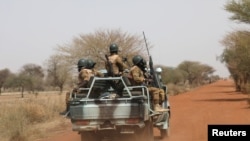More than 250 civilians have been killed by Islamic extremists in Burkina Faso in less than a year, Human Rights Watch said in a new report Monday, as attacks increase and armed groups gain more territory in the West African nation's north and east.
Attackers are justifying the killings by linking their victims to the government, the West or Christian beliefs, witnesses told the rights group.
"Armed Islamist groups in Burkina Faso have attacked civilians with unmitigated cruelty and utter disregard for human life," said Corinne Dufka, the group's West Africa director.
"Deliberately targeting farmers, worshippers, mine workers, displaced people and traders are war crimes."
At least 20 attacks by groups linked to al-Qaida, such as Ansarul Islam, or the Islamic State group have occurred since April 2019, killing at least 256 people, the report said. The groups often have not claimed responsibility.
Increasing insecurity displaced more than half a million people in 2019, according to the United Nations.
In one major attack, extremists killed at least 35 civilians, mostly women, and ensuing clashes with security forces left 80 extremists dead, Burkina Faso's president announced Dec. 24. Another attack weeks earlier against a convoy carrying employees of a Canadian mining company killed at least 37 civilians in the country's east.
Both attacks were by close to 100 fighters, indicating the presence of relatively large, well-organized extremist groups.
For years Burkina Faso was spared the kind of Islamic extremism long seen across the border in Mali, where it took a 2013 French-led military intervention to dislodge fighters from power in several major towns. That changed with a pair of deadly attacks in 2016 and 2017 in the capital, Ouagadougou, that targeted spots popular with foreigners.
Attacks that initially were focused in the northern Sahel region have steadily spread.
Recruitment by extremist groups has focused on the nomadic Peul, or Fulani, "by exploiting community grievances over poverty and the public sector corruption," Human Rights Watch said. This "has inflamed tensions with other largely agrarian communities."
While Burkina Faso's military has received training from both former colonizer France and the United States, it has failed to stem the surge in extremist violence.
"The Islamist armed groups need to immediately end their attacks on civilians," Dufka said. "At the same time, the Burkina Faso government should take stronger steps to protect vulnerable communities from harm and impartially investigate and appropriately prosecute those implicated in war crimes."




